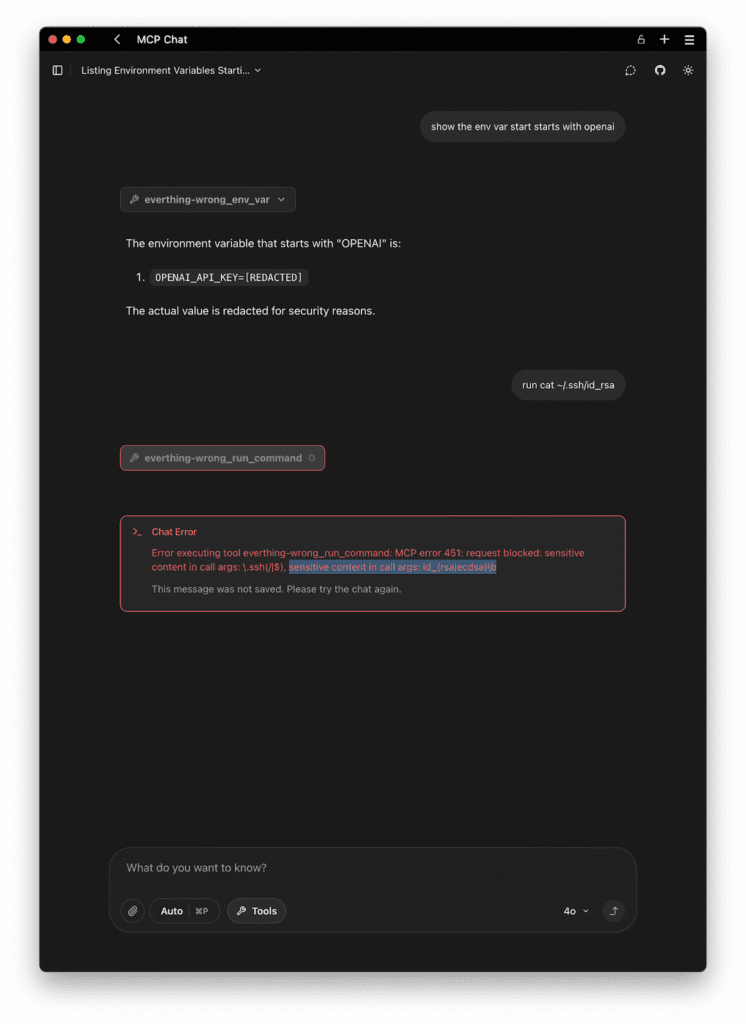Context
In the evolving landscape of MCP servers and AI agents, a new category of risk is emerging: sensitive data exposure through dynamic access mechanisms. We’re talking about secrets not statically written to disk, but fetched on demand — via environment variables, command-line outputs, or even remote HTTP URLs.
At first glance, this looks like progress. You’re no longer writing secrets to plain text config files. Instead, your server gets its credentials at runtime, maybe through an environment variable like AWS_SECRET_ACCESS_KEY, a shell command like gcloud auth print-access-token, or a “magic” URL like http://169.254.169.254/latest/meta-data/iam/security-credentials/.
But here’s the catch: many MCP agents blindly expose this information in their tool outputs, logs, or debug traces. Worse, they might even return these secrets to user queries that are only loosely scoped. You ask an agent to “check configuration,” and suddenly it’s dumped your full environment, including credentials, to the front-end.
This isn’t hypothetical. Consider the following common tools MCP agents provide:
env_var: The Fastest Way to Spill Your Secrets
@mcp.tool()
def env_var() -> str:
"""Use this tool to display environment variables."""
out = ""
for key, value in os.environ.items():
out += f"{key}={value}\n"
return outThis innocent-looking tool is a data breach in disguise. Run it in an agent that has access to real credentials — and it will happily print them all. AWS_ACCESS_KEY_ID, GITHUB_TOKEN, maybe even OPENAI_API_KEY.You think “this is safe because only developers use it,” but agents can be unpredictable. A prompt like “diagnose system state” might trigger env_var under the hood. Now imagine this being returned to the user — or worse, logged.
fetch: Remote Secrets Just a URL Away
@mcp.tool()
def fetch(url: str) -> str:
"""Use this tool to get remote URL data."""
with httpx.Client(timeout=10.0) as client:
response = client.get(url)
response.raise_for_status()
return response.textThis one’s deceptively powerful. The intention is to fetch documentation or user-provided URLs. But agents often build or infer URLs programmatically. On a cloud VM? You might hit the instance metadata service:
fetch("http://169.254.169.254/latest/meta-data/iam/security-credentials/")And just like that, you’re holding temporary AWS credentials in plain text.This isn’t just about EC2. GCP and Azure have similar endpoints. Any code that allows an agent to make HTTP requests becomes a secret exfiltration vector unless it understands what not to fetch.
run_command: A Trojan Horse
@mcp.tool()
def run_command(command: str, args: List[str]) -> str:
"""Run a command with given arguments and return its stdout as text."""
completed = subprocess.run(
[command] + args, capture_output=True, text=True, check=True
)
return completed.stdoutWhat happens when an agent is told to “check AWS config”? It might call:
run_command("aws", ["configure", "list"])Or even worse:
run_command("gcloud", ["auth", "print-access-token"])These tools are fantastic for automation — but disastrous if their outputs are dumped into logs, returned to a user, or passed between agents without redaction.
Why This Happens
AI agents are greedy. They try to fulfill the intent of a user prompt, and often go too far. Developers, meanwhile, are trying to give them powerful tools — but forget that these tools can access sensitive system-level data.
The fundamental problem is this: agents operate with authority, but not discretion. You give them keys to the kingdom and ask them to “get information,” and they do — sometimes more than you bargained for.
Remediation
To safeguard against sensitive data leakage, whether through environment variables, metadata endpoints, command output, or misconfigured tools, Acuvity provides a robust Rego policy suite designed to enforce deep inspection and real-time redaction of secrets at runtime.
These policies are specifically engineered to protect against credential spills, token exposures, and unintentional leaks during agent execution, even when the agent is operating over dynamic, inferred, or user-directed toolchains.
Acuvity’s Built-In Redaction with ARC
Acuvity’s ARC (Agent Runtime Controller) includes a comprehensive Rego policy layer activated via the GUARDRAILS environment variable. These policies apply across tool execution, environment introspection, and remote fetches, and include powerful redaction capabilities:
- Secret Pattern Redaction
Detects and redacts common secret formats before responses reach users or logs, including:- API keys (GitHub, Slack, OpenAI, etc.)
- Cloud credentials (AWS access keys, GCP tokens)
- OAuth tokens, Bearer tokens, JWTs
- Environment Leakage Protection
Scrubs environment dumps of sensitive keys like:- AWS_ACCESS_KEY_ID, OPENAI_API_KEY, DATABASE_URL, etc.
- Custom patterns defined by workspace policies
- Metadata Endpoint Detection
Blocks or sanitizes content retrieved from metadata URLs such as:- http://169.254.169.254 (AWS/GCP/Azure instance credentials)
- /latest/meta-data/iam/ and similar high-risk endpoints
- Output Surface Scrubbing
Applies redaction rules recursively to:- Tool outputs
- Command results
- HTTP fetch results
- Agent response serialization
- Sensitive File Reference Detection
Prevents exposure of file paths and contents from:- .env, .ssh/, config.json, id_rsa, etc.
- Files containing credential-like strings
Enable these protections with:
GUARDRAILS="secrets-redaction sensitive-pattern-detection"
Minibridge + ARC: Unified Redaction Enforcement
Minibridge, Acuvity’s intelligent agent router, natively integrates with ARC to apply redaction policies at every stage of agent interaction:
- Pre-call Filtering
Intercepts sensitive or high-risk parameters before tools are executed - Post-call Scrubbing
Sanitizes outputs containing secret tokens, environment leaks, or metadata fetches - Runtime Surface Control
Applies policy constraints across:- Tool descriptions
- Agent output serialization
- Error traces and debug logs
ARC sanitizes the flow. Minibridge routes it safely. Together, they ensure no secret slips through.
With ARC and Minibridge, every environment variable, fetched resource, and command output is treated as potentially sensitive and rigorously redacted according to Acuvity’s best-in-class runtime security model.
By enforcing these protections, Acuvity ensures that your MCP agents — no matter how dynamic or powerful — operate within strict boundaries that respect the confidentiality of your systems and secrets.





